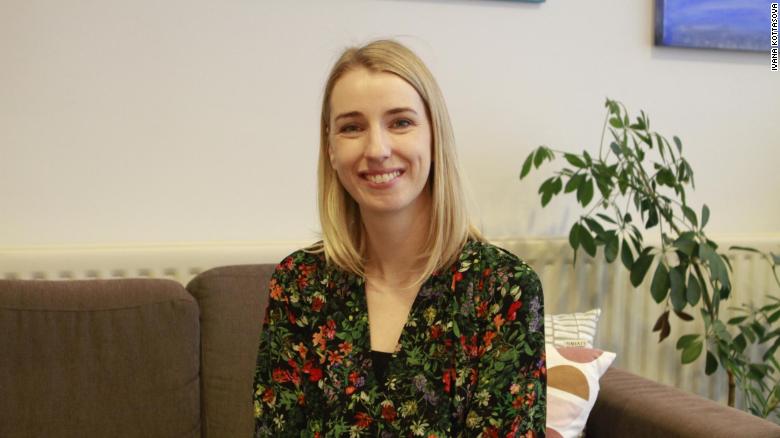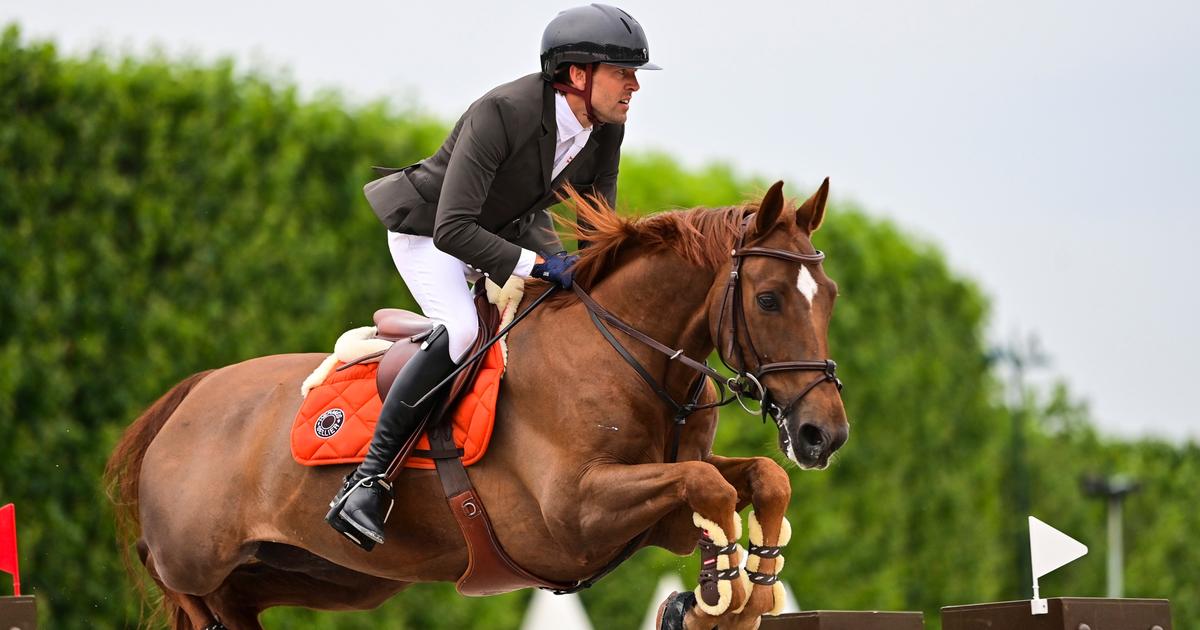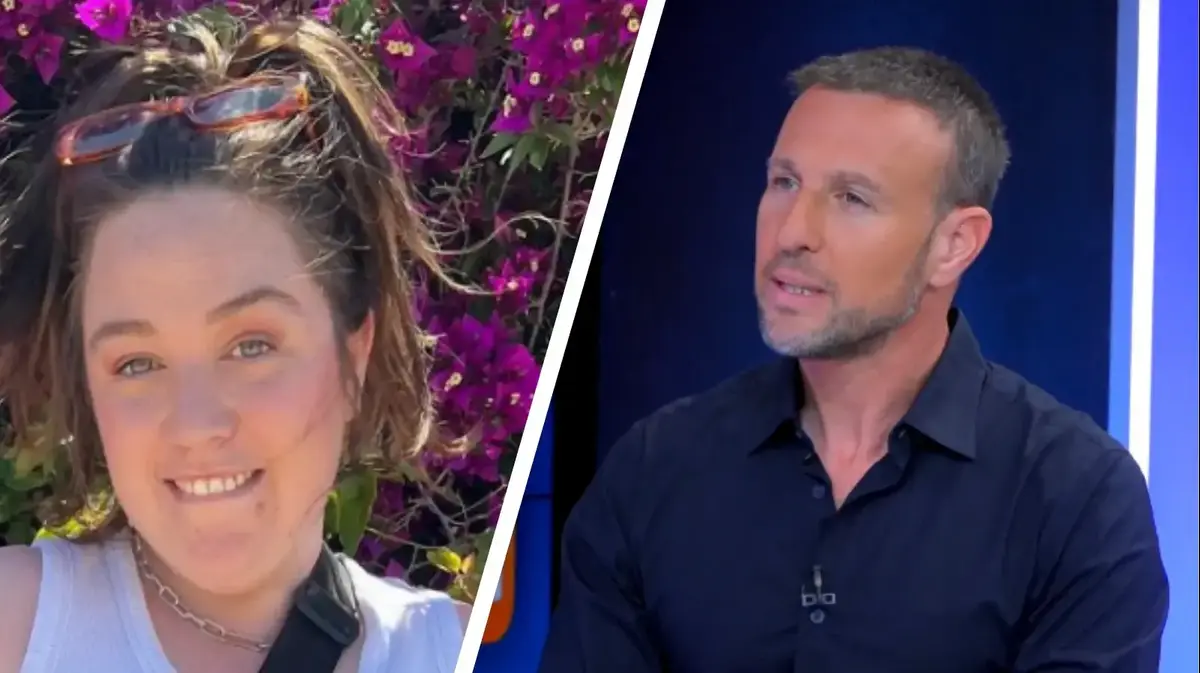This is how the pandemic impacted women, according to the UN (2020) 3:51
(CNN) -
The bruises on Maria Árnadóttir's body were numerous and ranged in color from pale yellow to deep purple.
According to court documents, the injuries were caused by Árnadóttir's boyfriend, who threw her across the room while trying to snatch the phone from her after she threatened to call the police.
During the days following the attack, Árnadóttir struggled to breathe.
Eventually he ended up in the ER, the documents say.
Speaking quietly in her suburban Reykjavik apartment, Árnadóttir told CNN that the man had attacked her before, but never as viciously as on that occasion in July 2016. "I really thought I was dying. I was crawling. and throwing back and forth. I thought, 'I'm going to die today,' "he recounted.
Months later, she says she plucked up the courage to go to the police, submitting photos of her injuries, medical notes, a list of witnesses to the violence and psychological abuse she was subjected to, as well as text messages from her alleged assailant. by then her ex-boyfriend, in which Árnadóttir says he admitted the assault and threatened to share nude photos of her if she spoke.
The court file includes all these documents.
According to court documents, the man denied assaulting her, but admitted to sending the threat, although he said he never intended to comply.
CNN contacted the man's attorney.
advertising
However, for the police, that evidence was not enough.
Gender equality would take another 100 years 0:50
A year and a half after filing charges, Árnadóttir claims he was told by police officers that the case was being dropped because it would not lead to a conviction.
Later he found out that it was not true.
The case had not been dropped.
On the contrary, the police did not interview the accused and, as a result, the statute of limitations expired in his hands, according to judicial authorities who subsequently reviewed the case.
Árnadóttir is one of several women who have collectively brought her government before the European Court of Human Rights (ECHR) for what they say is a misogynistic justice system that systematically violates the rights of victims of gender-based violence.
The strange twist of the story?
These women live in Iceland, which has long been considered the most gender-equitable country in the world.
Maria Árnadóttir is one of the women who have sued Iceland for violating the rights of victims of domestic violence.
In theory, Iceland is a great place to be a woman.
For 12 years in a row, it has been crowned the best place in the world for gender equality by the World Economic Forum.
It has world-leading equal pay and anti-discrimination laws.
Women hold 47% of the seats in Parliament and 46% of the management boards of Icelandic companies.
Nurseries are heavily subsidized and available to everyone.
Maternity health care is free.
What is the key to preventing violence against women?
But for Árnadóttir and many other women fighting for justice, Iceland's image as a feminist paradise is far off the mark, far enough to take the country to court.
The lawsuit, filed in March, was coordinated by several Icelandic NGOs, including Stígamót, a non-profit organization that campaigns against domestic and sexual violence and offers counseling to survivors.
Steinunn Guðjónsdóttir, Stígamót's spokesperson and fundraiser, told CNN that the group reviewed a series of recent cases of alleged violence against women that had been dismissed by police or prosecutors, and found that the rights of victims they had allegedly been raped in several of them.
Steinunn Guðjónsdóttir is the spokesperson and fundraiser for Stigamot, an NGO that fights against sexual violence, offers counseling to survivors and organizes prevention workshops.
Guðjónsdóttir said that among them were examples where the evidence was ignored;
in which the statute of limitations expired due to the lack of action of the police;
in which the victims were embarrassed;
and in which there was a total lack of transparency.
Guðjónsdóttir said there is still a significant gap between the law and the way it is being applied.
"The justice system considers rape to be a very, very, very serious crime, in terms of punishment, but it is not given the necessary human resources and attention. When there is a murder - which occurs very rarely in Iceland - all the police are going to investigate and it is a high priority. Obviously this is not the case with rapes, "he said.
Transparency is also an issue, Guðjónsdóttir said, noting that under Icelandic law, victims do not have the right to see their case files, which means they cannot follow the progress of an investigation.
In a statement to CNN, the Icelandic Ministry of Justice said that, although "it has concluded that a certain error was made during the investigation [of the Árnadóttir case], the government's view is that the error does not reach the level minimum severity "to qualify it as a violation of the European Convention on Human Rights.
Icelandic police did not comment on the case and instead referred it to the Ministry of Justice.
10 actions that are also violence against women (although it is difficult to recognize them)
The feminist paradise with a problem of gender violence
Murder cases may be rare in Iceland, but rapes are not.
According to a landmark 2018 study on trauma, a quarter of Icelandic women have suffered rape or attempted rape in their lifetime and around 40% have been victims of physical or sexual violence.
That number is significantly higher than the global average: the World Health Organization (WHO) says that around 30% of women worldwide have been subjected to physical or sexual violence by a partner or sexual violence. by third parties throughout his life.
Unnur Anna Valdimarsdóttir and Arna Hauksdóttir, two public health experts and epidemiologists from the University of Iceland who conducted the research, contacted almost all the women in Iceland.
They ended up surveying more than 30,000 people, almost a third of the entire adult female population in the country, spread across rural and urban areas and representing a diverse sample of Icelandic society.
They admitted that the results of their study surprised them.
"We were surprised by the high proportion of women who had suffered physical or sexual violence in their lifetime," Hauksdóttir told CNN.
"People had a hard time believing they were real numbers."
added Valdimarsdóttir.
"The spontaneous reaction is basically '40% ?! Impossible'".
Unnur Anna Valdimarsdóttir and Arna Hauksdóttir are public health experts and epidemiologists from the University of Iceland.
"I even have to admit that I didn't want to believe it myself," she said.
"And then I started talking to my friends and we started talking a lot about it, and it seems true ... when you look at your friends and choose 20 of them ... I would say that maybe eight of them have that experience."
Valdimarsdóttir and Hauksdóttir said the results were especially difficult to square with Iceland's strong culture of gender equality.
"Iceland is a great place to be a woman, we have access to healthcare, kindergartens ... to education and many things that most of the people who live on this Earth do not have ... but we still have these figures "Hauksdóttir said.
She said Iceland's own progress on gender equality may explain the relatively high number of women who report violence.
"In societies that have scored high on gender equality, you still see very, very high numbers [of violence] and it is paradoxical to see that, but the reason could have to do with the fact that women are very aware of when they are being raped in some way, "she said.
"Is that the case in other countries? These figures may be closer to the truth."
The research revealed another worrying thing: the proportion of women who experienced violence was very similar across all sectors of Icelandic society.
"Different backgrounds, different levels of education, different levels of income ... so it's not related to class," Valdimarsdóttir said.
"So you start thinking, 'Is this some kind of law of nature? Is it an essential part of human behavior?'
It's not just the blow: 5 facts about how violence against women profoundly affects your mental health
"The generational curse" for women
One group that was not surprised by the results of the trauma study was Öfgar, a feminist collective that aims to educate the public about violence and the culture of rape.
In fact, the group believes that the actual numbers could be even higher.
"I don't have a single friend who has not suffered sexual abuse, harassment, harassment or a toxic relationship," Helga Ben, one of the activists, told CNN during an interview with the group at a cafe in downtown Reykjavik.
One by one, the five women described their experiences of rape, forced consent, sexual abuse, and harassment.
They talked about the shame they experienced over and over again.
They call it the "generational curse."
"The idea that Iceland is a feminist paradise has been put into us since we were children: 'Why are they so angry? Do you see those women in third world countries? ... You have so good [the situation] '"said Ólöf Tara, one of the women participating in the group.
Thousands of women take to the streets in the 25N to protest against the increase in gender violence
"But (about) the violence that women have faced over the years, we've never had the power to speak up about it. Violence thrives in silence, because if you speak up, someone connects with you. story and she realizes that this is also her story and then she can go for help and break the pattern, because it is a generational pattern. I inherited it from my mother and my mother inherited it from her mother, just like my grandmother from his mother, and I will pass it on to my descendants if we don't talk about it, "added Hulda Hrund Sigmundsdóttir.
Öfgar's mission is to reach out to the youngest people, trying to raise awareness through funny but forceful videos on social media on topics such as sexual consent and date rape.
They also offer help and support to victims and have played a key role in the second wave of the #MeToo movement in Iceland.
The group said it realized it had to "do something" when it continued to receive allegations of violence and sexual harassment about one particular man, a local celebrity in Iceland.
Tanja Ísfjörð is one of the women's rights activists involved in Öfgar.
"We had survivors who came to tell us about what he did, and it was a period of 10 years of violence against women, against young girls, and we think that this cannot continue, he cannot continue doing what he is doing," she said. Tanja Ísfjörð, who joined the meeting remotely, speaking to the rest of the group from a laptop screen resting on a low coffee table.
Without naming the man, Öfgar published the testimonies of more than 20 women who claimed to have been abused and harassed by him, sparking a huge outcry across the country.
More victims came forward, but the group also faced a significant backlash, including personal threats.
"We were accused of making up stories and trying to cancel it, but the only ones who have been canceled are the survivors," said Tanja Ísfjörð.
The feminist writer Rebecca Solnit shares her experiences of violence against women in her book "Memories of my nonexistence"
The man was removed from the poster of a major cultural event in Iceland and alleges he suffered professional consequences following the allegations.
He denied wrongdoing and threatened to sue the group for damages.
He has not been charged with any crime.
CNN contacted him repeatedly for comment, but got no response.
The revelations set off a new wave of the #MeToo movement in Iceland, where several other men, including members of the national soccer team, were accused of sexual misconduct and cover-up.
The entire executive committee of the Icelandic Football Association resigned in August after its president, Gudni Bergsson, denied that the association had received complaints of sexual violence, a claim that was later proven false.
The alleged assailant, identified as Kolbeinn Sigþórsson, later issued a statement admitting that he had behaved inappropriately, but denied any violence.
The "right path" is not working
The backlash against Iceland's #MeToo movement was one of the things that sparked the lawsuit against the government.
"With #MeToo, women are coming out and naming the men who raped them, even if they haven't brought charges against them, and a lot of people are like, 'Wow, wow, wow! You can't do it like this, you have to do it the right way, '"Guðjónsdóttir told CNN.
"There is a lot of pressure on survivors to do the 'right thing' and press charges and try to get the perpetrator convicted, but the 'right way' is not working, the vast majority of cases don't even make it to the judge. So no they get no judgment on whether the author is guilty or not. It's a disaster, "he said.
It is likely that the ECHR will take several years to rule on the lawsuit.
Meanwhile, Árnadóttir's fight continues.
He says that he has been diagnosed with post-traumatic stress disorder (PTSD), that he has had to take time off from work and that it is sometimes difficult for him to carry out everyday tasks.
She blames her mental health problems on the judicial system, which she says has failed her.
"The Icelandic government acknowledges that there were errors in the investigation of the case, which led to its dismissal due to the statute of limitations," Fjalar Sigurðarson, head of information at the Icelandic Ministry of Justice, told CNN in a statement.
He said the reason for the delay in the investigation was "uncertainty" about what charges to bring, adding: "Prescribing cases in the care of the police is very rare in criminal proceedings in Iceland."
Women march in San Salvador to demand for the disappeared and for their rights
While the case concerning the physical attacks against Árnadóttir was time-barred, his ex-partner was convicted on other charges of threats in 2020. According to court documents, he admitted to having sent the threats, but said he never intended to carry them out.
He was sentenced to 45 days in suspended prison and ordered to pay compensation for damages, according to publicly available court documents.
The country's National Court dismissed the man's appeal earlier this year, upholding the decision.
CNN contacted the man's attorney for comment.
"This shows that the judicial system took the case seriously," Sigurðarson said.
Árnadóttir has put all her energy into becoming an activist, speaking from her experience and drawing the attention of some of Iceland's top officials.
As a legal professional, he has discussed his case with the Minister of Justice, pressing for reforms.
Icelandic National Police Commissioner Sigríður Björk Guðjónsdóttir publicly apologized to her "for the damage she received from our system", stressing that the police force is working on reforms and "taking a victim-oriented approach" in the cases of gender violence.
The reform is gaining momentum, and for Árnadóttir that is the most important thing.
"I have a daughter, I have friends, I don't want anyone to have to go through what I went through," he said.
"We have to change the system."
Iceland Misogyny Violence against women Gender violence












/cloudfront-eu-central-1.images.arcpublishing.com/prisa/KMEYMJKESBAZBE4MRBAM4TGHIQ.jpg)


